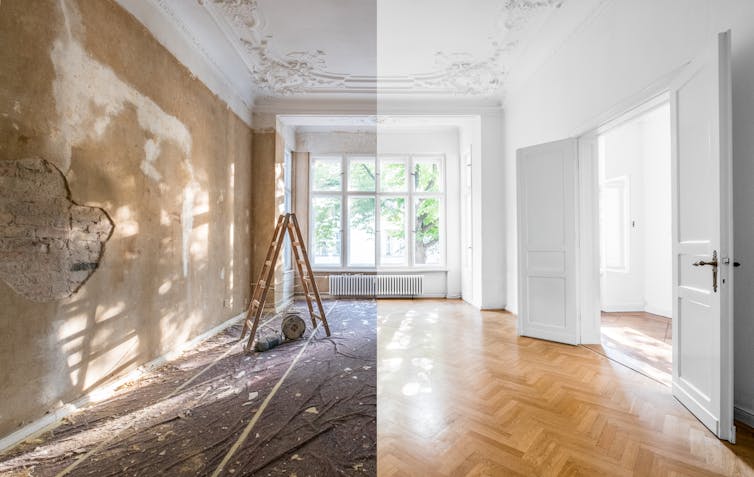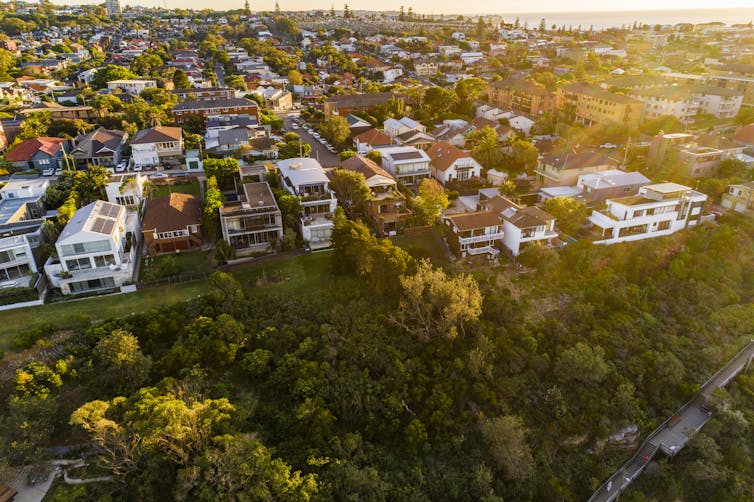What adds value to your house? How to decide between renovating and moving
- Written by Sara Wilkinson, Professor, School of the Built Environment, University of Technology Sydney
The government’s HomeBuilder scheme allows certain home owners to apply for a tax-free grant of A$25,000 if they are spending between $150,000 and $750,000 renovating a home or building a new home. Eligibility criteria are strict.
The scheme has boosted renovation talk in some circles (although, as CoreLogic has pointed out, it may merely bring forward works that were already planned).
Here are some questions to ask yourself when trying to decide between renovating and moving – and how to add value to your existing home.
Read more: Scott Morrison’s HomeBuilder scheme is classic retail politics but lousy economics
What adds value to a house?
Property market observers advise updating or renewing bathrooms or kitchens – even small fixes such as replacing a cracked or dated splashback, replacing a bath or adding skylights can go a long way.
Think about easy repairs that create an invaluable good first impression – a fixed-up fence, a new carpet or resurfaced flooring or even good old decluttering.
But remember you’ll only qualify for HomeBuilder if you plan to spend at least $150,000 on an owner-occupied home worth no more than A$1.5 million (CoreLogic has listed which suburbs have the most owner-occupied properties under A$1.5 million).
 Get expert advice before you dive in.
Shutterstock
Get expert advice before you dive in.
Shutterstock
Factors to consider if you’re thinking of renovating
How long till you retire? How secure is your employment? Thinking carefully about your earning potential between now and retirement will help you understand how what you can borrow and afford. If you are planning to stay, you will get the benefit and enjoyment of the renovations.
Do you need to stay close to school or work? If that’s a consideration, renovating may be worth more to you than buying further out.
Look closely at what your property is worth (there are plenty of online calculators) and keep track of how much similar local properties with one extra bedroom or bathroom sell for. That will give you a sense of the value-add to your home equity that a renovation might represent.
Be honest with yourself about the total cost of renovation. There are myriad expenses not always initially apparent. These may include:
- planning fees (the cost of getting a development assessed by council)
- the cost of architectural drawings
- consultants’ fees for environmental impact statements or arborists’ reports
- extra costs due to a heritage listing
- renting, if it’s not possible to live at home during renovation
- the cost of protecting underground public assets such as water or sewerage pipes
- extra costs caused by poor access or other limitations.
Consider the possible long-term savings of retrofitting your home to be more energy-efficient. Proper insulation, secondary glazing, draught excluders and solar PV energy are expensive upfront but will save on long term running costs. It’s likely, as energy costs increase, homes that are at least partially off grid will be more attractive and valuable over time.
And remember that for some, even with help from HomeBuilder, renovation won’t stack up economically.
Some older people may eschew home renovation to put money aside to help children get a foot on the property ladder.
Others may decide potentially expensive renovation is worth it to hold onto a family home to which children return as they get older. It might sound sentimental but the idea of Christmas in the family homestead is worth it, for some.
Tax considerations
Find out what tax breaks, if any, you might be eligible for if you renovate to divide the family home into a smaller space (if you’re keen to downsize, or enhance the accessibility of your home, for example) and adding a self-contained granny flat.
However, if the granny flat is leased out, this section of the home would be considered income-producing. Your “main residence” is generally exempt from capital gains tax when it comes time to sell, but you may not qualify entirely for this exemption if a section of the property is income-producing.
You may also consider remodelling the family home into a duplex and, depending on council planning laws, convert the title into dual occupancy. However, these suggestions may complicate eligibility for the HomeBuilder grant (which seems to exclude property investors, although there’s no mention of partly converting the main place into a dual occupancy).
The best option here is to seek advice from a tax specialist.
Factors to consider if you’re thinking of selling up and buying elsewhere
Use a stamp-duty calculator and cost-of-selling calculator to get a rough idea of those costs.
How important is proximity to work? Particularly if the coronavirus pandemic has opened your (or your employer’s) eyes to working remotely, would you consider a move to a more remote area where you can afford a bigger house?
Chat with a range of real estate agents and get into the habit of reading market media coverage. Have a sense of what houses sell for that featured your desired attributes (such as more bedrooms or off-street parking).
As a chartered building surveyor, I’d advise would-be downsizers to be cautious when buying a brand new high-rise apartment, due to risks of potentially costly defects that might become apparent over time.
And remember, even if you do sell and buy a new place, very few are able to find the perfect home. You may decide to make renovations anyway.
 Find someone who has been through it and ask what they’d do differently.
Shutterstock
Find someone who has been through it and ask what they’d do differently.
Shutterstock
There are no easy answers. It comes down to your individual circumstances, your attitude to risk and ensuring you have a good grasp of the relative costs of each option.
Talk to a financial adviser, tax accountant, real estate agents, builders, architects and others who have been through each process about what they’d do differently next time.
Read more: Australia's housing system needs a big shake-up: here's how we can crack this
Authors: Sara Wilkinson, Professor, School of the Built Environment, University of Technology Sydney





